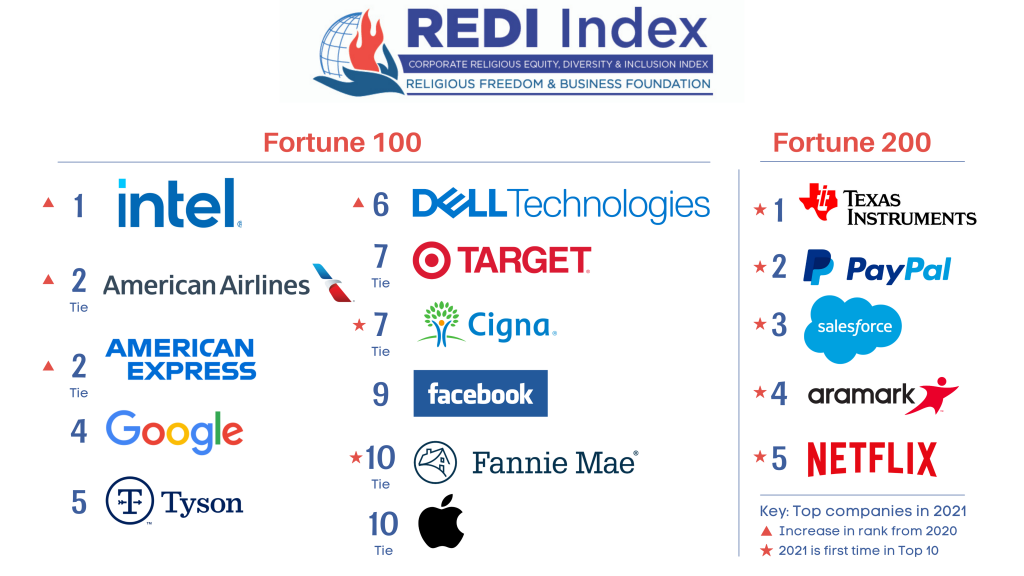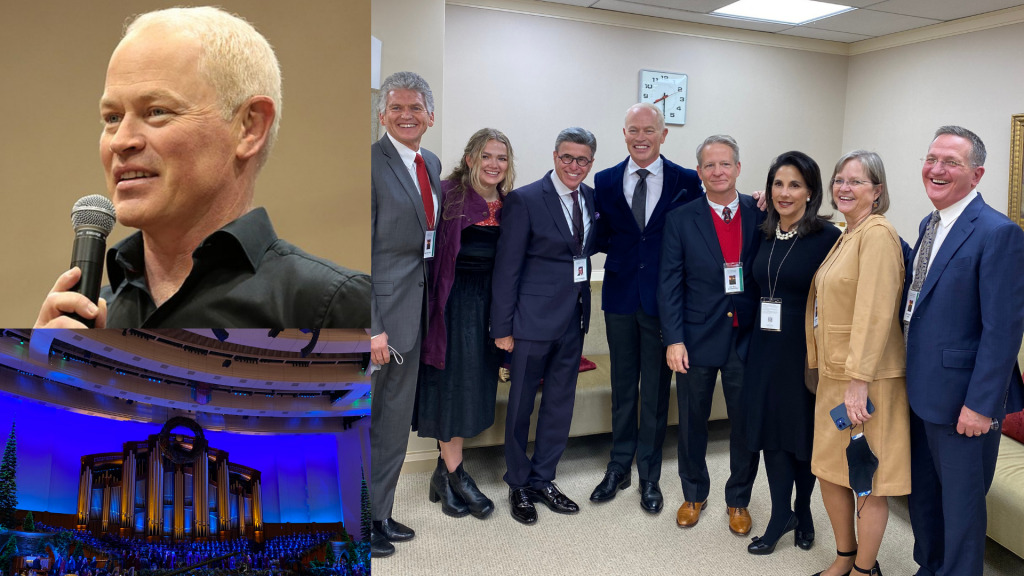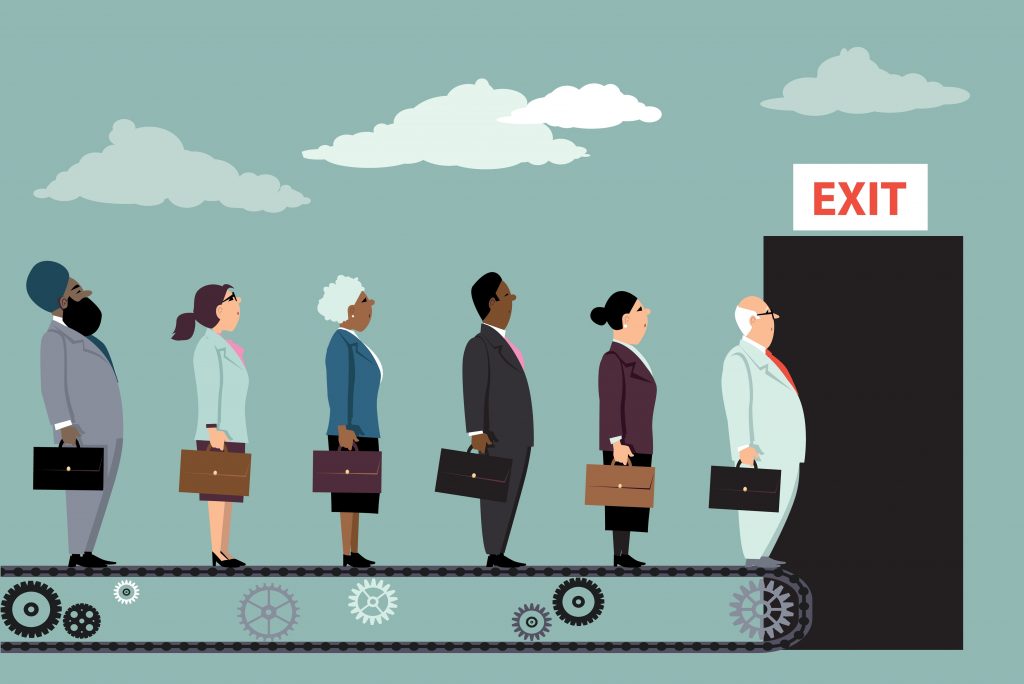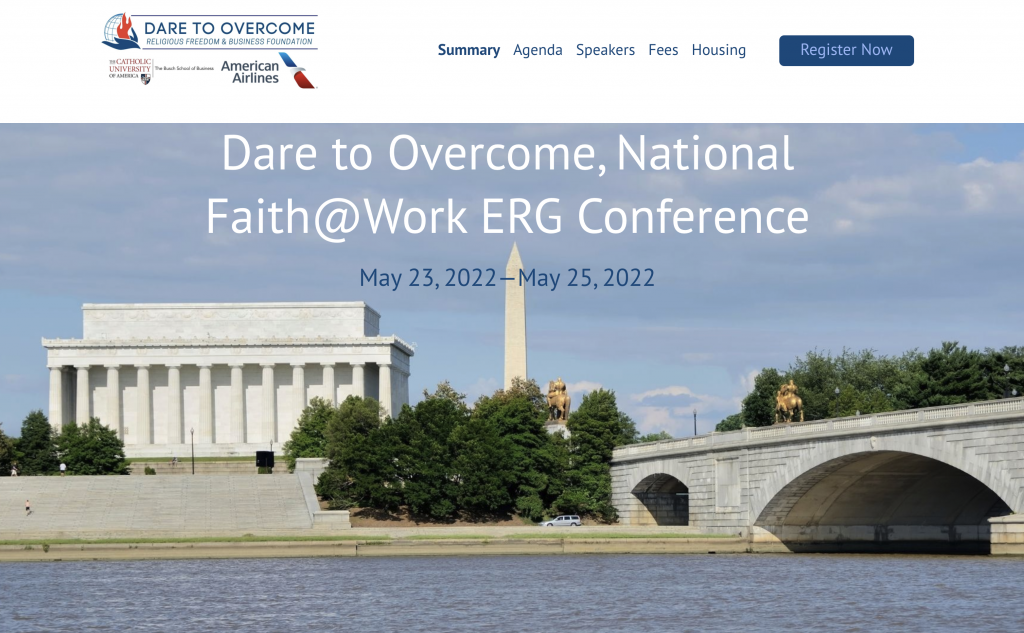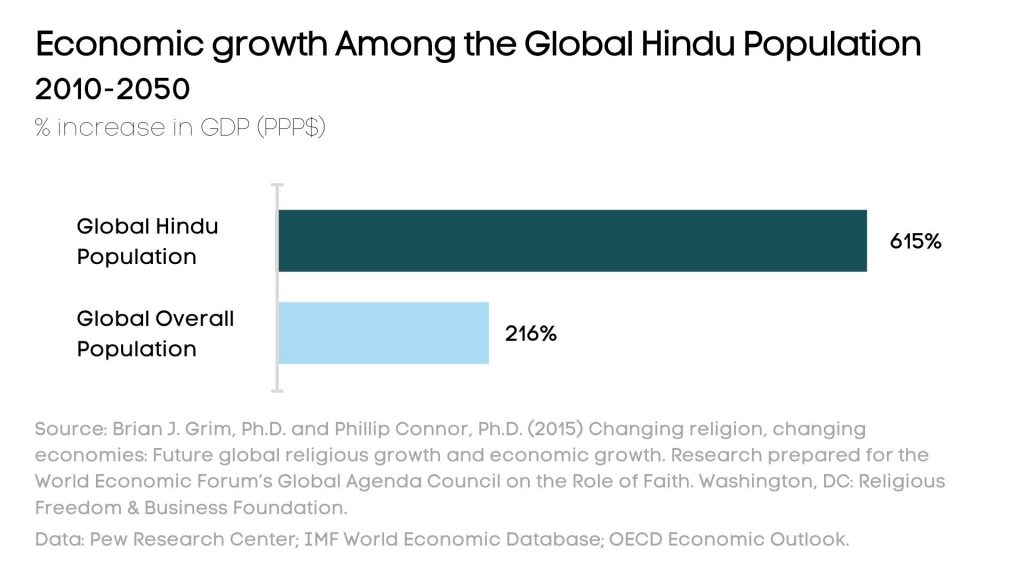Category Archives: All
Top 3 RFBF Stories from 2021 for Christmas
Meeting Actor and Producer Neal McDonough
18 Dec, 2021
by Brian Grim
Yesterday, I met actor and producer Neal McDonough, known for appearing in movies like Marvel’s “Captain America: The First Avenger” and TV shows like HBO’s “Band of Brothers”, “Suits” and CW’s “Arrow.” He is a husband and father of five, a devout Catholic.
As the Salt Lake Tribute reports, “And right now, he is the narrator of The Tabernacle Choir at Temple Square’s annual Christmas concert, which is being taped before limited audiences for airing on PBS at holiday time in 2022. And McDonough has no issue teaming up with the premier performing troupe of The Church of Jesus Christ of Latter-day Saints.
“We spend so much time as humans worrying about what the right church is,” he said Friday. “By bridging [Latter-day Saints and Catholics] together, it shows that whatever it takes to glorify God and to be better human beings in his eyes is the goal of any religion and any belief.”
“Whether you’re Catholic or Mormon, Muslim or Jewish or Buddhist or agnostic or atheist, [this show] is a chance for us all to figure out ‘how can we be better on this planet?’” he said. “We’re all brothers and sisters in the eyes of God.”
Read full story.
Also at the meeting with McDonough organized by Ron Gunnell (Executive Producer Talent, for the Choir), were Bill and Karla Ahmanson, and my wife, Julia Beth.
Paul Lambert Discusses Religious Inclusion With U.S. Navy DEI Team
14 Dec, 2021
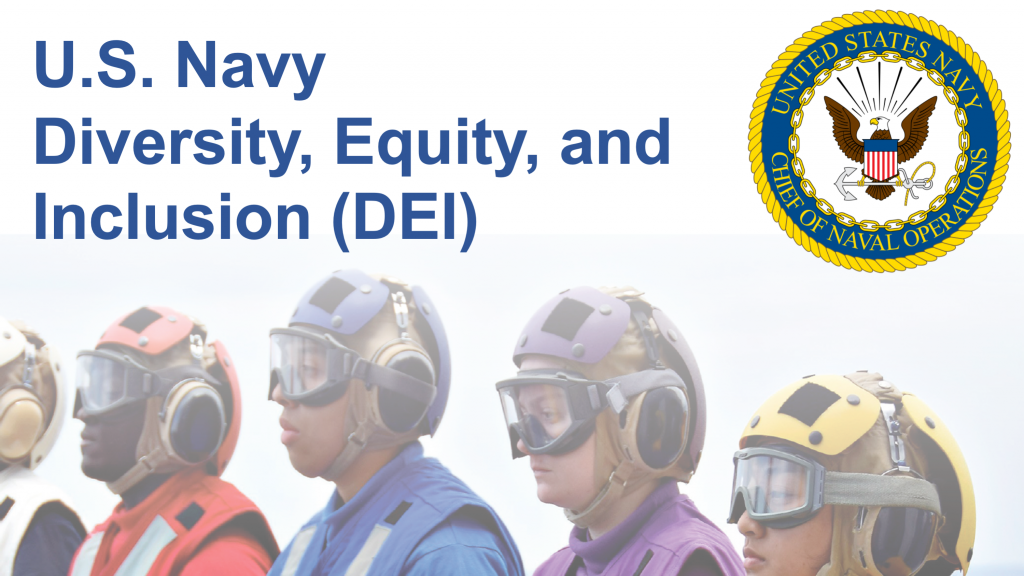 On December 9, Paul Lambert, Senior Business Fellow of the Religious Freedom & Business Foundation, met virtually with active duty sailors and civilian employees of the United States Navy from around the world to discuss religious accommodation in the workplace.
On December 9, Paul Lambert, Senior Business Fellow of the Religious Freedom & Business Foundation, met virtually with active duty sailors and civilian employees of the United States Navy from around the world to discuss religious accommodation in the workplace.
The session was part of the Navy’s larger Diversity, Equity, and Inclusion (DEI) Webinar Series that started earlier in 2021. The DEI webinar series is a monthly virtual learning experience tailored to DEI practitioner needs. The series addresses the need for a continuous, accessible, and relevant DEI training and education program. This was the first time that the webinar series has addressed the topic of faith and belief as an aspect in DEI at the Navy.
In addition to highlighting lessons learned from other organizations that have developed policies and practices to support a faith-friendly environment, such as Tyson Foods, Google, and Intel, Lambert led a discussion on religious literacy in the workplace and principles of religious accommodation and how such principles can be deployed in a Navy context.
Dr. Jessica Milam, Diversity, Equity and Inclusion Advisor in the Office of Naval Operations noted, “Navy DEI practitioners across the fleet brought back valuable knowledge to their commands on how we all experience religion differently and how to be inclusive through active listening and applying accommodation principles. It is the first of many conversations in this space and we are thrilled that Paul shared his expertise and knowledge with the US Navy.”
Of the session, Lambert noted, “it is encouraging to know that an organization like the Navy, that is at the heart of our government and that employs tens of thousands of people, is focused on ensuring that all of its people can bring all of who they are, including their faith or no faith, to work with them.”
The Navy joins a quickly growing number of organizations that recognize the necessity of including faith and belief in their larger DEI efforts and have dedicated training time for their workforce to learn how to implement religion and belief accommodation practices.
Read more on U.S. Navy Diversity, Equity, & Inclusion in the U.S. Navy.
Physical Isolation and “The Great Resignation”
13 Dec, 2021
by Kent Johnson, J.D., Senior Corporate Advisor, Religious Freedom & Business Foundation
Part of the blog series, Authenticity & Connection
The so-called “Great Resignation” has prompted corporate soul-searching. Gallup says 48% of workers are actively searching for a change. Many workers are suffering from disconnection. The physical isolation entailed in the pandemic response heightens that sense of disconnection. What can stem the exodus?
Relationships matter. Employees are much less likely to leave if they have meaningful personal connections with coworkers, and if they feel appreciated and valued. So, especially in this spatially challenged environment, a strategic focus on authentic and deep relationships among employees is warranted.
Here are three of the hurdles to relationships that flow from “work from home”:
(1) Self-Segregation. In the past, many of us were physically grouped with a diverse team of colleagues at the office. Personality conflicts and differences of outlook had to be worked through. Now, it’s easier to avoid meaningful connection with those with whom we disagree. We’re more prone to open up personally only to those who – we think – are like us. [To be sure, even working side by side, people can still “hide”; but it’s harder to do so. And working physically near one another can add opportunity for friction; but, navigated with mutual respect, it also opens avenues for more meaningful connection.]
(2) Fear and Distrust. Our natural tendency is to connect soulfully only with “like minded” people, and worry more about “those people” who are different. Are THEY trying to restrict our freedoms? To force us to act like we adopt worldviews that are contrary to our core beliefs? Physical isolation may drive “like minded” people together virtually, but it makes trust across diverse employees more challenging.
(3) Superficial Conformity. Physically set apart and relegated to their respective personal spaces, it’s tougher for diverse employees to authentically connect with others on the heartfelt personal WHYs of their work. We expect people to work collaboratively in a manner that conforms to the company’s high-sounding stated values; yet we often stifle their expression of how those company values dovetail with their own. Lacking a sense of personal connection, it often seems that the official stated company values lack depth, sincerity, connection and consequence. It’s no wonder, then, why employees’ loyalty to the company is thin; and that they’re looking elsewhere.
So, what can be done? I’ll start by mentioning two courses of action that DON’T work: First, “faith avoiding” – doing nothing to encourage authentic person-to-person communication – will enable the natural forces of isolation to prevail. Many workers equate management silence on matters of faith and belief to a gag order… they must not speak of the things that define them as persons. Second, on the other extreme, a heavy-handed approach to religious diversity will backfire if the company is seen as requiring people of faith (or atheists or agnostics) to compromise their core beliefs.
Much of the isolating effect of electronic media and “work from home” can be overcome if the company skillfully promotes authentic and respectful communications about faith and belief. As David Miller of Princeton and Jeff Haanen of the Denver Institute for Faith and Work have noted, merely “tolerating” faith falls short. Many employees long for richer connection with their coworkers; but they’re constrained by the impression that the company views such topics as distractions.
The focus on encouraging employees to speak of their core identity and belief isn’t a fringe movement. As the Religious Freedom & Business Foundation has noted, premier companies are embracing religious diversity in positive ways (see the REDI Index). But many employers still actively avoid such topics, or, at best, tolerate minimal references to faith like one might have to tolerate mosquitoes.
In sum, a corporate culture of meaningful, authentic connection requires an intentional strategy that leans against the isolating forces of physical separation, so that when we do gather, and even if we don’t, it’s clear that we value each other as human beings and care about one another regardless of our differences.
Encourage your employees to talk with one another about their core identity and core beliefs that relate to work. Benchmark with the growing number of companies that have navigated this well. Engage consultants like the Religious Freedom & Business Foundation that have helped, and stem the tide of The Great Resignation.
Vietnam: Religious Literacy Training
11 Dec, 2021
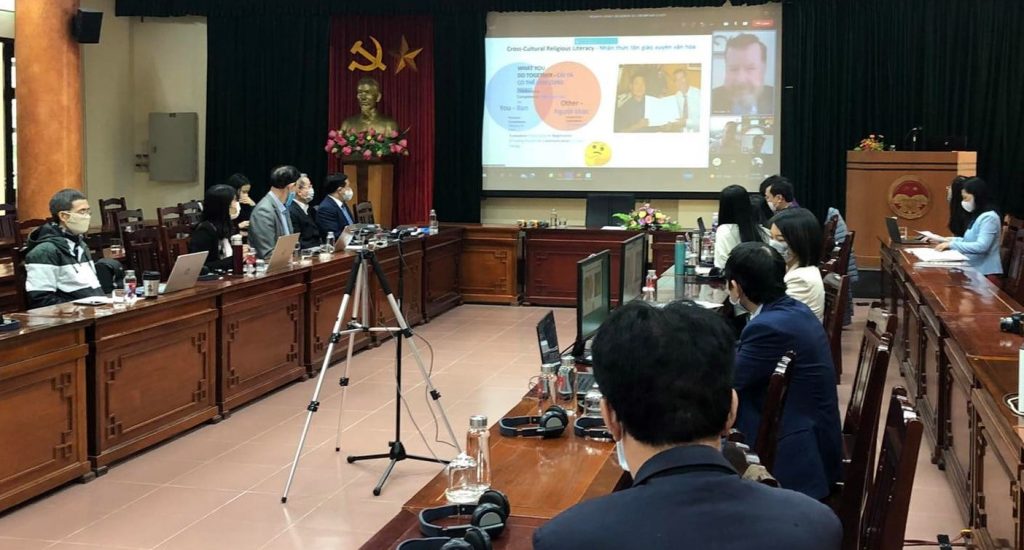 On. Dec. 9, Dr. Brian Grim, President of the Religious Freedom & Business Foundation, introduced more than 160 religious education and legal trainers in 63 different municipalities and provinces of Vietnam to how the world’s biggest and best multinational corporations, such as Google and the Intel Corporation, are building cultural and religious pluralism that results in productivity, profit and social progress.
On. Dec. 9, Dr. Brian Grim, President of the Religious Freedom & Business Foundation, introduced more than 160 religious education and legal trainers in 63 different municipalities and provinces of Vietnam to how the world’s biggest and best multinational corporations, such as Google and the Intel Corporation, are building cultural and religious pluralism that results in productivity, profit and social progress.
The virtual conference, was organized by the Institute of Religion and Belief at the Ho Chi Minh National Academy of Politics (NAP) in partnership with the Institute for Global Engagement and BYU’s International Center for Law and Religion Studies.
Objectives
Research and teaching on religion contributes to raising awareness of the public about religious literacy and providing good policy advice on religion to lawmakers. In this Training of Trainers program (TOT), NAP lecturers will have opportunity to improve their knowledge on religion and apply it to their teaching at the provincial level.
The organizers of the TOT have successfully conducted two training courses on religion and the rule of law for government officials and faith leaders in 2018 and 2019 in Can Tho and Quy Nhon provinces. The annual training was postponed in 2021 due to the pandemic.
In this context, a short-term training course on religion for NAP lecturers was held online. This virtual event brought together government officials and scholars who work and teach about religion from many different disciplines. They explored research and approaches to new methods and perspectives in the field of religious research and pedagogy at the national and international level.
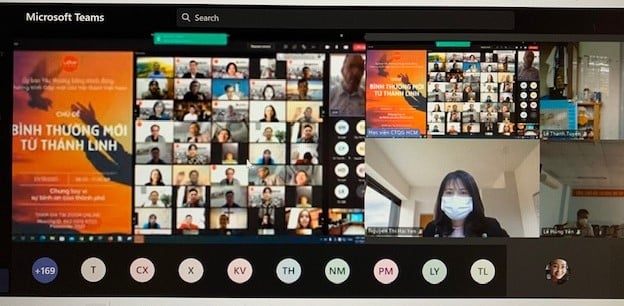
G100 Meeting in NYC
10 Dec, 2021
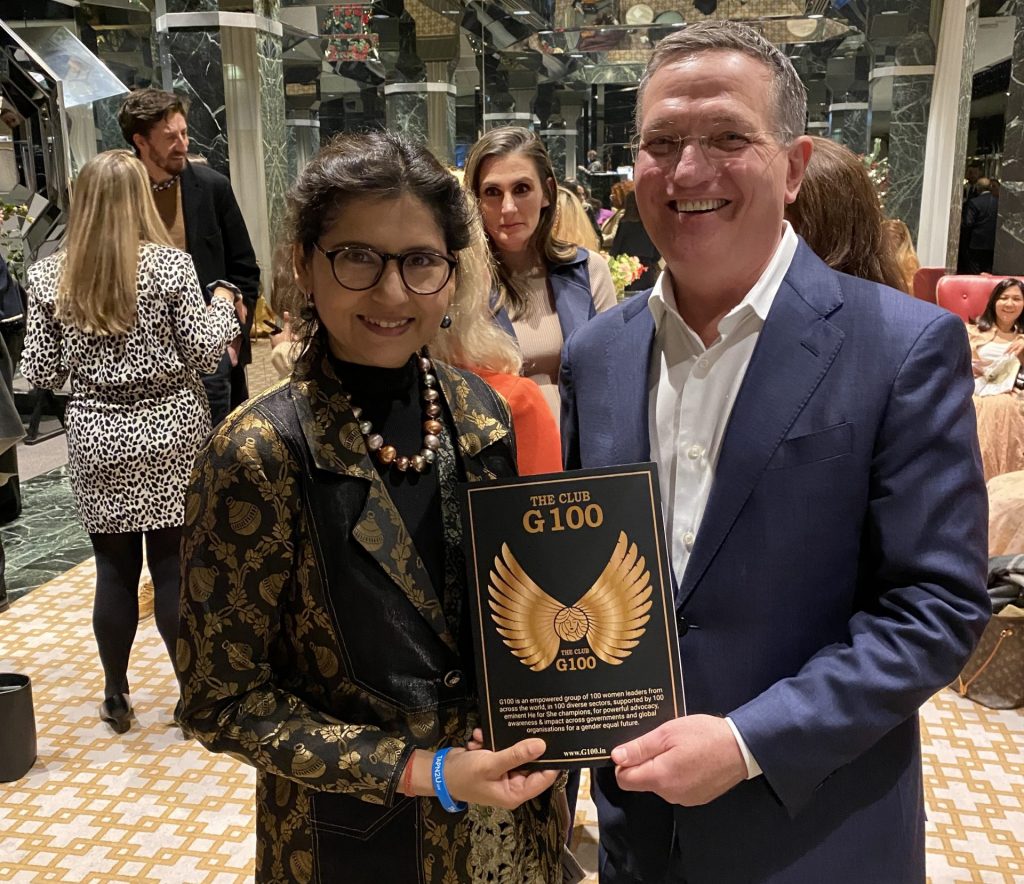 by Brian Grim
by Brian Grim
Our recent global survey of religious freedom advocates found there are links between religious freedom and other human rights issues. These include poverty, human trafficking, migrant rights, LGBTQ rights, press freedom, and women’s rights.
Related to women’s rights, last week I joined a meeting in NYC of the G100, whose vision is create an equal, progressive & inclusive environment for women worldwide. The G100 includes Nobel Laureates, former Heads of States, Ministers, Businesswomen, Philanthropists, Investors, Entrepreneurs, Corporate and Community Leaders – working in 100 different sectors with chapters worldwide.
Dr. Harbeen Arora founded and leads the G100 (pictured above). Based in New Delhi, India, Dr. Arora has created a global movement for women’s empowerment inclusive of all faiths and beliefs. She is a businesswoman, philanthropist, author, humanitarian, and spiritual seeker who believes in the ancient Indian ethos of the world as one family.
Learn more here.
4 Texas Instruments Vice Presidents share why religious inclusion is so important
10 Dec, 2021
Watch to hear the answers to these questions:
How does your faith impact your daily life and your role in the workplace? How do faith-based networks support employees during challenging and difficult times? How have you grown as a leader and what have you learned as a result of sponsoring a faith-based ERG? How do faith-based values enrich our company culture? How do our faith-based ERGs help bring TI values to life?
National Faith-Oriented 2022 ERG Conference Registration Open!
8 Dec, 2021
As Biden Convenes Global Democracy Summit, China’s Restrictions Multiply
3 Dec, 2021
 by Brian Grim
by Brian Grim
On Dec. 9-10, the Biden Administration will convene a two-day virtual Summit for Democracy, kicking off what’s billed as a “year of action” intended to buttress democracy against the worldwide trend of rising authoritarianism, with an in-person gathering planned for December 2022.
The backdrop for this is, of course, the assertive posture that the People’s Republic of China has taken under Xi Jinping’s leadership.
This week the Economist explores whether the draconian Covid restrictions in China (and I’d add the massive incarceration of Uyghurs in Xinjiang and suppression of democracy in Hong Kong) may point to systemic and serious weaknesses. For instance, by highly restricting international travel, the economic costs are not just losses for the travel industry, but also for future competitive innovation, as illustrated by this quote from the Economist:
“Jack Ma, the founder of China’s giant e-commerce platform, Alibaba, started his first web company after a visit to America in 1995. Cao Dewang, the boss of Fuyao Glass, a Chinese company made famous by the documentary “American Factory”, ventured into manufacturing after a trip to the Ford Motor Museum in Michigan. (The museum’s significance struck him only on the plane home, he told an interviewer, so he immediately booked a return flight to make a second visit.)”
A free link to the full article is available here.
Anther sign of a move away from the innovation sector is that new graduates are shunning innovative tech industry jobs for what are perceived to be stable civil service government jobs. Indeed, “More than 2.12 million candidates registered for China’s national civil service exam – known as the guokao – that took place this week. The figure was up sharply from 1.58 million last year, 1.05 million in 2009 and 125,000 in 2003. This year, they’re competing for about 31,200 jobs at 75 central government agencies and 23 attached institutions, giving them a 1-in-68 chance of success. Those hired will start their new jobs next year,” reports the SCMP (owned by Alibaba).
Additionally, China’s ongoing crackdown on religion adds another weight dragging down what has been remarkable economic growth spurred on by the relative religious openness following the Cultural Revolution of the 1960s-1970s.
In “Chinese Secret to Sustainable Economic Growth: Under Threat?” I make a data-driven argument showing that as China continues to impose extreme restrictions on religion and religious groups, the prospects for its continued economic decline grow.
Six Top U.S. Tech Execs Now India-Born
30 Nov, 2021
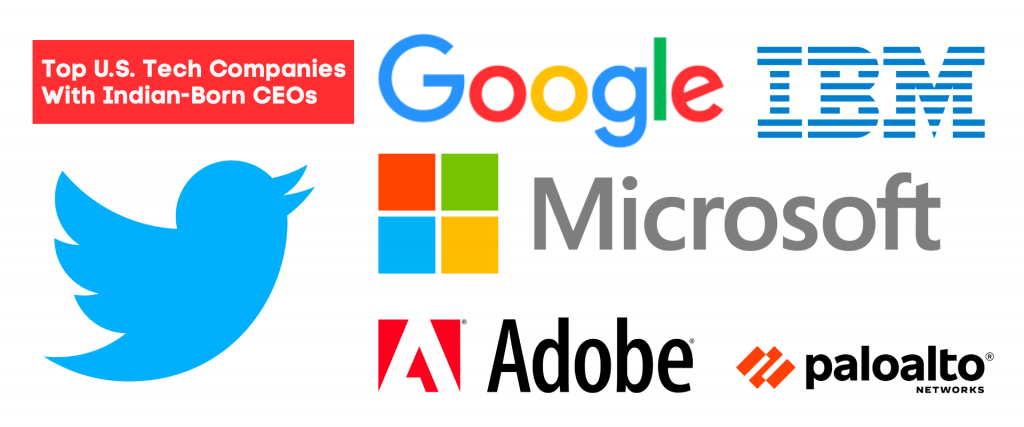
by Brian Grim
Little-known data point: Hindu populations projected to have fastest growing economies by 2050
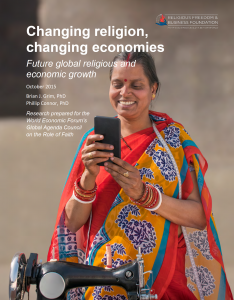 Six top U.S. tech companies now have India-born CEOs with this week’s appointment of Parag Agrawal as Twitter’s new CEO. While it is not a matter of public record whether all of these CEOs practice Hinduism (and certainly not all India-born CEOs do, e.g., Span Construction CEO King Husein is Christian), having a rising number of US India-born CEOs draws attention to a little-known data point from our study prepared a few years ago for the World Economic Forum’s Global Agenda Council on the Role of Faith.
Six top U.S. tech companies now have India-born CEOs with this week’s appointment of Parag Agrawal as Twitter’s new CEO. While it is not a matter of public record whether all of these CEOs practice Hinduism (and certainly not all India-born CEOs do, e.g., Span Construction CEO King Husein is Christian), having a rising number of US India-born CEOs draws attention to a little-known data point from our study prepared a few years ago for the World Economic Forum’s Global Agenda Council on the Role of Faith.
We estimate that global GDP at the disposal of Hindu populations is expected to increase by 615% between 2010 and 2050 (see chart). This growth in GDP is substantially more than projected overall global GDP growth of 216% for the same time period. This not only outpaces overall growth, but is makes Hindus the fastest growing economic group among all major religions, according to the study.
This means we can expect to hear much more from Hindus on the global stage in the coming years. That can, of course, be very good when compared to the anti-religious stance of their giant neighbor, China, as long as the voice is one that promotes a faith-friendly future for all (including those without a faith), as espoused by Covenantal Pluralism.
But the challenge is real: A recent survey by the Pew Research Center finds that Indians generally say they do not have much in common with members of other religious groups, and large majorities in the six major groups say their close friends come mainly or entirely from their own religious community.
On the other hand, there is a tremendous open door for Covenantal Pluralism to grow: The same Pew survey found that most people (84%) say that to be “truly Indian,” it is very important to respect all religions (see chart). Indians also are united in the view that respecting other religions is a very important part of what it means to be a member of their own religious community (80%). People in all six major religious groups overwhelmingly say they are very free to practice their faiths, and vast majority (91%) say that people of other faiths also are very free to practice their own religion.
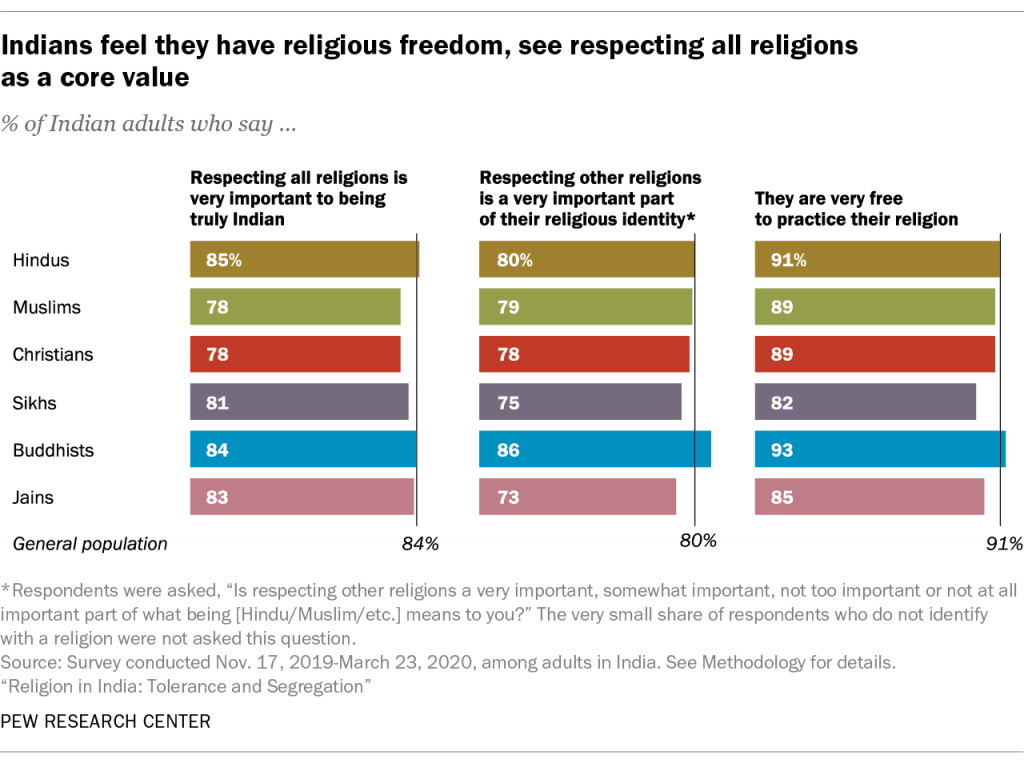
The open door for Covenantal Pluralism is even more evident (and promising) when looking at common practices across India’s religious groups. Pew’s study also finds that India’s religious groups share several religious practices and beliefs (see chart): “After living side by side for generations, India’s minority groups often engage in practices or hold beliefs that are more closely associated with Hindu traditions than with their own. For instance, many Sikh (29%), Christian (22%) and Muslim (18%) women in India say they wear a bindi – the forehead marking often worn by married women – even though the bindi has Hindu origins. Meanwhile, Muslims in India are just as likely as Hindus to say they believe in karma (77% each), as do 54% of Indian Christians. Some members of the majority Hindu community celebrate Muslim and Christian festivals: 7% of Indian Hindus say they celebrate the Muslim festival of Eid, and 17% celebrate Christmas.”
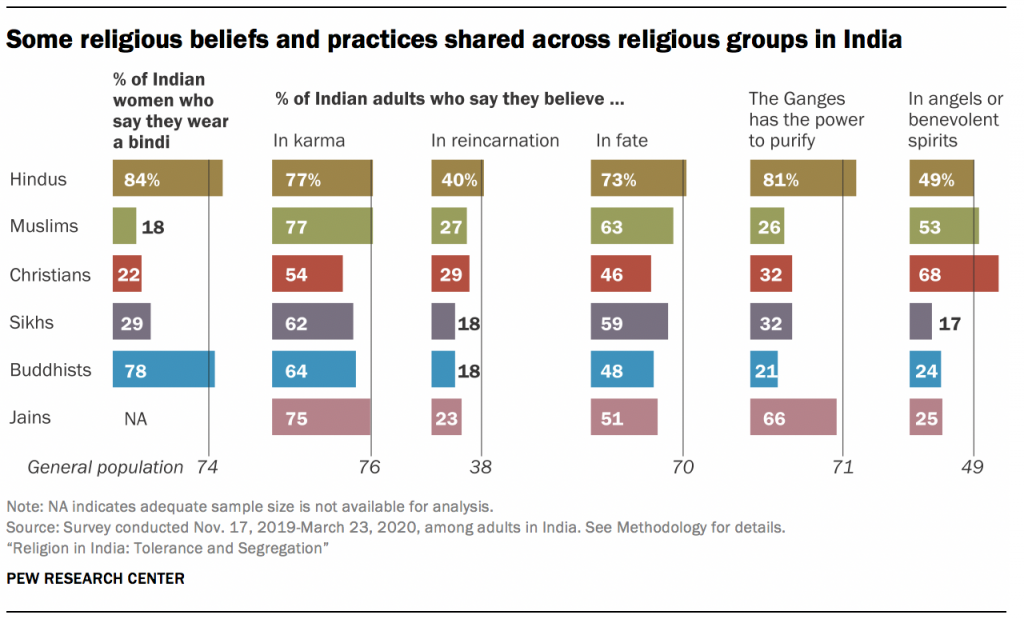
While Western Christian theologians might scratch their heads to find that nearly a third (29%) of Indian Christians believe in reincarnation (just 11 percentage points fewer than Hindus, 40%), it reveals the actual beliefs and practices of people. As the Religious Freedom & Business Foundation emphasizes in its religious literacy programs for corporations, people cannot be best understood by beliefs theologians may hold, but by their actual beliefs, what faith organizations they belong to, and their behaviors, which may be idiosyncratic or cultural, rather than dogmatic or religiously mandated.
This open door of shared beliefs and practices – as shown by the Pew data – is one which companies in India can capitalize on and be the drivers of mutually respectful engagement across faith traditions, as is demonstrated by one of our 2021 Global Business & Interfaith Peace Award winners, Candice Corby, CEO of US and India-based Cobra Legal Solutions.
The text of Corby’s Award states: “Cobra provides rights and freedoms for all religions and beliefs in the workplace and promotes the celebration of religion and belief, encouraging employees to be their full selves including bringing their faith and beliefs to work. Cobra Legal Solutions accomplishes the goal of being a religiously inclusive workplace by observing every festival and religious holiday world-wide and by hosting a commemoration for religions in a week known as “Cobra Life Week” [see video].”
And for an example of an Indian-born CEO working for religious freedom, see this video:
Latest News
Donate
Thank you for your support!


